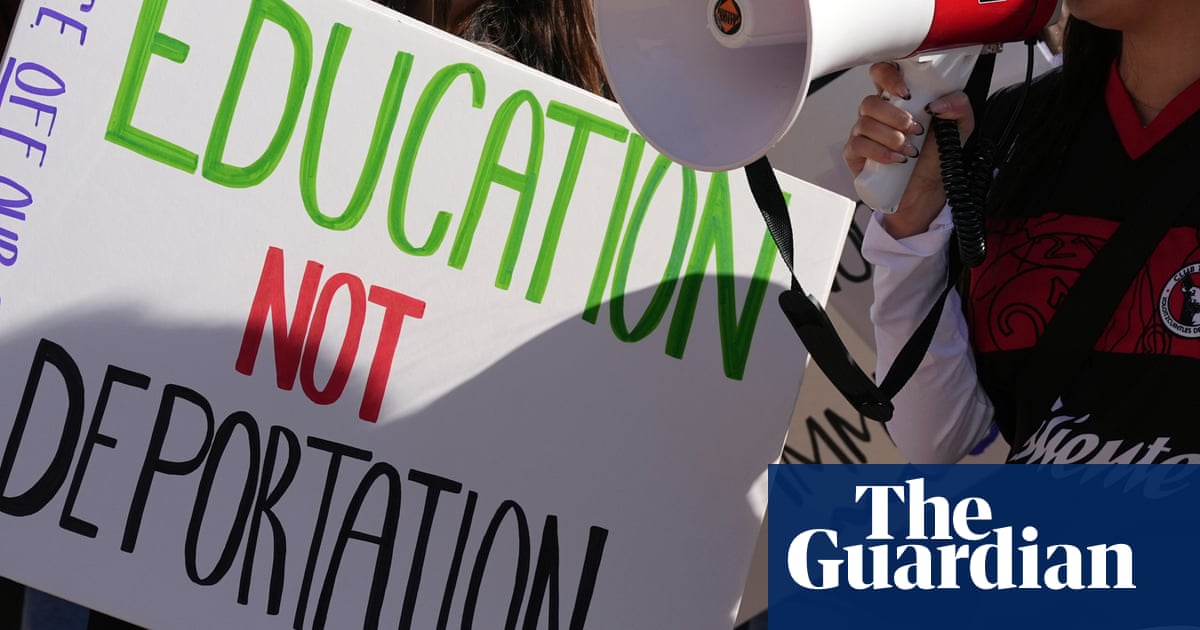The US government is restoring the legal status of hundreds of international students after a wave of lawsuits challenged the abrupt suspension of their visas.
The sudden policy reversal was announced during a court hearing in Oakland,California, which brought together eight lawsuits filed by international students who argued that the federal government had terminated their right to remain in the US without due process. Attorneys in those cases had asked the court to issue a nationwide injunction covering all students whose legal records were terminated since 1 March, and were at risk of deportation.
On Friday, assistant US attorney Elizabeth D Kurlan said that Immigration and Customs Enforcement (Ice) is developing a new policy to govern how records are terminated on the Student and Exchange Visitor Information System (Sevis), a federal database used to track international students’ immigration status. A similar announcement was made in a court in Washington.
In recent weeks, numerous students received notifications that their records were terminated with little explanation, jeopardizing their legal right to remain in the US and sparking outrage and confusion. Some said they had their status revoked for infractionsas minor as a speeding ticket.
“DSOs [designated school officials] certified to assist international students) around the country are freaking out because out of nowhere they’re starting to see Ice manipulating the Sevis system to terminate students’ records around the country,” plaintiffs’ attorney Brad Banias said in an earlier interview.
According to the Department of Homeland Security (DHS), once a Sevis record is deleted from the database, which is often called being “terminated”, a student immediately falls out of status and risks deportation or future visa denials unless they quickly depart the US or regain lawful status.
Until the new Ice policy is finalized, Sevis records for the plaintiffs and other students affected by similar terminations will remain active or be reactivated. On Thursday afternoon, students across the country began receiving official notices from their schools stating that their Sevis records had been unexpectedly reactivated.
The news has brought some relief but not a full resolution, with some students saying the change has already caused irreparable harm.
“They call it a ‘restoration’, but for those of us who lived through it, who’s accountable for what we lost?” said one California student, who asked to remain anonymous. She was in the US on an F-1 work authorization when her Sevis record was terminated in April, she suspects due to being fingerprinted when she received a driving ticket six years ago. Her employer fired her the next day after learning she could no longer legally work.
The judge ordered the government to submit an explanation of the policy and its legal impact by the end of Friday. All plaintiffs in the hearing were granted 14-day temporary restraining orders (TROs) shielding them from deportation or any adverse legal consequences.
Marc L Van Der Hout, one of the plaintiffs’ attorneys, said he believes Ice’s new policy is a direct response to a recent order from the US district judge Jeffrey S White, who presided over Friday’s hearing in Oakland and had already granted TROs in some of the eight lawsuits.
“They’re trying to argue the court doesn’t need to act now – but they’re only doing this because of Judge White’s order, 1,000%.”
According to data collected by National Association of Foreign Student Advisors (Nafsa), more than 1,400 students have reported Sevis terminations so far this year, with about 40% of them from India and China.
Nationwide, more than 70 lawsuits have been filed in 21 states challenging Sevis terminations. In at least 45 cases, judges have granted temporary restraining orders, citing possible violations of the Administrative Procedure Act and due process protections.
Sign up toThis Week in Trumpland
A deep dive into the policies, controversies and oddities surrounding the Trump administration
after newsletter promotion
Kurlan added that Ice retains the authority to terminate Sevis records for other reasons, such as a student failing to maintain lawful status or engaging in what it considers to be removable conduct.
Pam Johann, a lawyer for the US government, argued against the request for national relief in the Oakland courthouse on Friday, stating that the agency’s ongoing actions to restore Sevis records make such an order unnecessary. Government lawyers responded that Ice is already addressing the issue in real time and that a nationwide injunction would be an “extraordinary remedy”.
Judge White pushed back. “Seems like with this administration, it’s a new world order every single day,” he said. “I think the administration writ large has a tendency to do everything in this particular area on an ad hoc basis, and we have to now consider it.”
Plaintiffs’ attorney John Nicholas Sinodis said unresolved gaps in Sevis timelines could still put students at risk of deportation or future visa denials. Lasting harm has already been done, especially for those who filed for reinstatement or left the US believing their status had ended.
Following the news, plaintiff expressed a mix of relief and lingering anxiety. “I’m worried my record might still have a stain, and it could cause problems later with jobs, visas, or getting through immigration,” said one, who asked to stay anonymous due to concerns about retaliation.
According to court records, their status was terminated based on an arrest record on reported domestic violence two years ago that did not result in any charges.
Despite the uncertainty, they remain confident about the eventual outcome. “I believe we will win, because I know very clearly that I don’t deserve this.”
